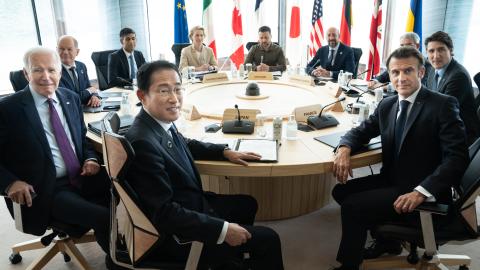As the leaders of the Group of Seven (G7) met over the weekend in Hiroshima, Japan, one message was clear: Security for Asia and Europe is indivisible. Parts of the G7 Leaders’ Summit rightly focused on security in Europe — highlighted by a surprise last-minute visit by Ukrainian President Volodymyr Zelenskyy. For Japanese Prime Minister Fumio Kishida, however, as the only sole Asian member of the G7 and host of this year’s summit, making sure that the challenges China presents to Japan and the Indo-Pacific carried throughout the conversations over the weekend was key.
The security environment in the Indo-Pacific has been changing these past few years. While North Korea traditionally had been Japan’s greatest concern, the increasing presence of China’s military in the region — along with Beijing’s more aggressive diplomatic attitude, use of economic means as a political tool, and continued omission of international rules and norms — has turned China into the greatest security challenge not just for Japan but for the U.S. and its partners. Just last December, Tokyo released its first national security strategy in nearly a decade. Similar to what American officials have been saying for years, this document made clear that China “present[s] an unprecedented and the greatest strategic challenge in ensuring the peace and security of Japan and the peace and stability of the international community.”
Japanese political leaders see their country as the first line of defense if there were to be a conflict with China; they see allies such as the U.S. as mostly safe across the Pacific. Because of this, there has been a growing sense that Japan needs to increase its security. It has become more of a concern for Japan recently, especially after Russia’s invasion of Ukraine reminded Tokyo that war is still possible — and after former House Speaker Nancy Pelosi (D-Calif.) made a trip to Taiwan last year that was followed by a massive military drill around Taiwan by China’s People’s Liberation Army. These events have led Japanese officials to believe what’s happening in Ukraine could happen in Taiwan, and to push for an increase in Japan’s defense budget and investment in new defense capabilities.
Taiwan is one of the biggest security concerns for Japan. Japanese lawmakers increasingly see Japan’s security tied to the security around Taiwan. For the past three years, each G7 Leaders’ Communique has included similar language to: “We reaffirm the importance of peace and stability across the Taiwan Strait as indispensable to security and prosperity in the international community.” And bilateral meetings between Prime Minister Kishida and President Biden and U.K. Prime Minister Rishi Sunak on the sidelines of this G7 reiterated the importance of peace and stability around Taiwan.
There’s appetite in Europe to engage more in Asia, and on more than just the issue around Taiwan’s security, but it’s slow-going compared to Japanese and American initiatives. While Japanese and American officials are more lockstep on challenges like China than ever before, there is still an understanding that without the help of European partners, any actions taken to maintain a free and open Indo-Pacific will be less meaningful.
One way Tokyo has been looking to increase European participation is through its own defense reforms. As a part of its national security strategy, Japan plans to work more with U.K. and Italian partners to build fighter jets. From this, in January, Japan and the U.K. announced a Reciprocal Access Agreement, which means greater cooperation between their forces. And just recently, NATO announced plans to open its first liaison office in Asia, in Japan.
For an island nation such as Japan, which is scarce in natural resources and relies heavily on trade as well, China’s economic presence creates new challenges in addition to traditional security challenges. Tokyo isn’t alone in this thinking. More European partners are starting to question whether there’s too much reliance on China as an economic partner, and that their economic relationship is no longer paying dividends to their diplomatic relationship. For example, Italy soon may leave China’s Belt and Road Initiative that was launched as a way for Beijing to shore up resources while promoting its global investments.
The complicated economic relationship G7 members have with China is why this year’s summit included a focus on economic security. Tokyo has been pursuing policies focused on economic security for a couple of years. While the term “economic security” is generally ambiguous, Japanese policymakers are focused on building “strategic autonomy.” It’s a strategy that essentially ensures that Japan isn’t too reliant on any one country for resources or production, in case those means of production were ever to be used against Japan for political reasons. It also includes a strategy to make Japan indispensable to the global economy. Where better to build on these two pillars of strategic autonomy and indispensability than at a summit attended by leaders from some of the world’s largest economies.
But there are questions whether Japan, America and others can build economic resiliency. Specifically, there are questions about which tools can be used to do so. Japan still hopes to use free-trade agreements as a means to build stronger supply chains — especially outside of China. Most recently, the United Kingdom moved one step closer to joining the mega trade agreement in Asia, the Comprehensive and Progressive Agreement for Trans-Pacific Partnership. But trade agreements are essentially dead in Washington while export controls and sanctions are in vogue.
The past few years with the pandemic has created a lot of unease in Japan, the U.S. and Europe when it comes to supply-chain resiliency. For example, regarding semiconductor chip supply chains, there’s now more or less a free-for-all as each region races to subsidize domestic production of chips. While there may be little faith in the resiliency between these regions, there seems to be a general agreement that these activities are fine, as long as it doesn’t involve China.
We should expect to see more European consideration for a free and open Indo-Pacific after this G7. Europeans are rightly much more concerned about China these days, thanks in part to the efforts of Japanese officials. While the economic relationship between these regions remains in question, at least the traditional security environment will receive greater attention.















